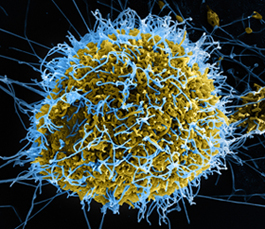Virus expert: Ebola threat to UK remains 'extremely low'
Release Date 26 August 2014

As the Ebola outbreak continues in West Africa, and with a British nurse now receiving treatment in a London hospital after contracting the virus, University of Reading virologist Professor Ian Jones provides comment.
Read more background on Ebola >>>
from Professor Jones and his Reading colleague Dr Ben Neuman.
Professor Ian Jones, a virologist at the University of Reading, said:
"The Ebola outbreak centred on West Africa continues but has increasingly dedicated support for its cessation, underpinned by the WHO statement of a Public Health Emergency of International Concern (PHEIC). Recent developments include the repatriation of an infected UK National to a specialist isolation facility at the Royal Free Hospital in North London, and the availability of a new drug from the health ministry of Japan. A separate outbreak, unrelated to that in West Africa, has also been declared in the Democratic Republic of Congo.
"Throughout the ongoing situation it is important to remember a number of key facts:
- The virus concerned has not changed in any way and if its spread can be restricted the outbreak can be brought under control.
- The virus can only be contracted by direct contact with an already infected individual, it does not spread easily.
- The infection is extremely serious but prospects for the patient improve dramatically if diagnosis and treatment are rapid.
- Experimental drugs may help and their availability is to be welcomed but it is not yet clear how effective they will be on a wider scale. Infection control by quarantine and contact tracing remain the established method for Ebola control.
- In general the level of threat to the average citizen is extremely low."
